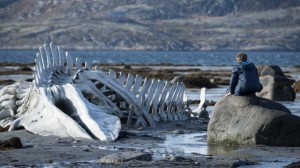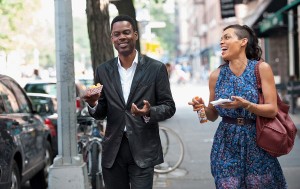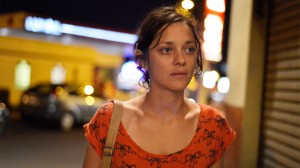Laughter, Tears—and Bottles of Vodka
Leviathan (2014) 4/4
Unflinchingly tense, staggeringly well-made, thought-provoking, and brimming with emotion, Leviathan is a Chekhov-style family tragedy; a subtle, extremely barbed satire exposing criminality in contemporary Russia; a film possessed of both classic sweep and sharp modern relevance. Filled with a desolate beauty, it’s a stupendous piece of work, a tale for vertiginous times, a grave and enormous epic that’s impossible to ignore.

Not to be confused with the acclaimed 2012 whaling documentary, although likewise dealing with submerged monsters, Leviathan gathers like cautionary thunder about the dangers of fighting city hall corruption. Loosely inspired by the Book of Job and set against the Barents Sea, the grim Russian narrative recounts Kolya (Aleksei Serebryakov), a man striving to protect his home from a behemoth: the belligerent town mayor, Mer (Roman Madyanov), who swills vodka like water and swaggers like a despot. Confronted with the imminent threat of demolition, Kolya recruits a slick Moscow lawyer, Dmitri (Vladimir Vdovichenkov), to help, but his arrival brings further misfortune.
Directed by Andrei Zvyagintsev (The Return, Elena) with cynicism, religious fervour, and an unflinching ambition, the incendiary and bone-rattling Leviathan is a trenchant and tough-minded tragedy, a black social comedy, and a thinly-veiled political parable drenched in bitter irony. Zvyagintsev credits Thomas Hobbes’ 1651 tome of the same name for inspiring its outlook on governmental control; its rolling scope, astonishing cinematography, and commanding performances make for a giant of a film, like A Serious Man meets House of Sand and Fog meets Revanche.
Stunningly shot and wrenchingly acted, especially by Madyanov, this is searing filmmaking executed on a grand scale. Mikhail Krichman’s cinematography captures the sublime grandeur of the landscapes. Zvyagintsev combines allegory, brutal melodrama, black humour, and striking compositions, each frame dense with meaning. Yet amidst the immaculate craftsmanship, he never loses sight of the humans, who are allowed to display improvisatory behaviour that deepens the majesty of the rigorously orchestrated tableaus. Indeed, the performances are knockout, and the script drum-tight, a Best Screenplay winner at Cannes.
Mammoth and muscular, haunting and heartbreaking, frustrating and painfully funny, Leviathan has a feeling of expansiveness; its power and its horrors sneak up on you. It’s a dense, multilayered picture, one firmly rooted in a specific landscape, a dramatic coastal spot dotted with the carcasses of decrepit fishing boats, as well as the magnificent skeleton of one long-dead whale. Absolutely gripping and emotionally devastating, Leviathan is visceral, rebellious fare, a modern classic weaving together rich characters, thriller elements, witty satire, and political bite. It’s indisputably one of the great films of the year.
Taking aim against the corrupt, corrosive regime of Vladimir Putin, Leviathan presents modern Russia as a country rotten to its core – corrupt, hypocritical, and godless. As sobering as a week-long hangover, it’s a symbolic, impossibly sophisticated portrait of a state that puts bureaucracy before community, about an unforgiving pyramid structure that helplessly crushes the little guy, with God, or at least the Orthodox Church, perched on top.
After offering a number of potentially heroic narratives, Zvyagintsev takes pleasure in undercutting each of their claims to supremacy. He is the calm surveyor of a fallen world, and Leviathan never writhes out of control. But Zvyagintsev’s pessimism is leavened by both his compassion and glancing comedy, as well as his sense of cold beauty of setting and bold, curious themes, which leave a lasting wonder.
Like so many Russian works of art, this is bleak, bleak stuff. Leviathan is a movie about a feeling, or more accurately, about a lack of feeling – about what happens to people in a dominant culture of bullying and abuse, when they have no escape except the next shotglass, no options except not waking up. The pitiless way that Zvyagintsev metes out punishments to all is savage, and you might want that four-way vodka by the end. But Leviathan has the heft and impact of a proper, old-fashioned Russian novel: it leaves you feeling changed at the end.
The shortness of life compensates for its brutish and nasty tendencies, and only the stillness of nature can provide a semblance of peace. In the world of this remorseless, brutal masterpiece, no wonder the bottle beckons.
Top Five (2014) 2.5/4

Savvy, scathing, and scurrilously funny, Top Five is a pyrotechnic pinwheel of a personal comedy, reverberating with savagely prowling wit and sabre-sharp one-liners. It’s a crude, clumsy, culturally tone-deaf reminder that as often as comedy fails us, it can be our best hope for resuscitation.
Top Five tells the story of New York City comedian-turned-film star Andre Allen (Chris Rock, Madagascar), who tries to make it as a serious actor when his reality-TV star fiancée (Gabrielle Union, Cadillac Records) talks him into broadcasting their wedding on her show. His unexpected encounter with a journalist (Rosario Dawson, Sin City, Unstoppable) forces him to confront the career – and the past – that he’s left behind.
Screened in the Special Presentations section at TIFF, Top Five is the nearest we’ve come to hearing writer-director-star Chris Rock’s authentic comic voice on film. It’s a career highlight for its creator, as good as Rock’s best standup work. Top Five bridges the gap between his on-screen and stage personas, and Rock is killer: enormously appealing, balancing his patented abrasiveness with a real tenderness, proving that his comic groove is stronger than ever.
Dawson also makes the most of her lay therapist love interest character, transcending caricature and achieving a charming, intriguing mix of vulnerability and poise. Most filmmakers bungle the opportunity to capitalize on Dawson’s talents, other than filling up the screen with her goddess-like beauty. In Rock’s hands, she’s stubborn and endearing and a force to be reckoned with.
Raucous, raunchy, and relentlessly filthy, Top Five is also semi-autobiographical and buoyantly self-sustaining. Like an airdrop of candy over the city, it mixes the sweet with the salty, the naughty with the remarkably kind. Genial, energetic, and sharp-eyed, it feels freshly minted because the man who made it has such a lively mind and fearless style. It’s one of the comedy standouts of 2014.
Top Five strikes one like a revenant from Hollywood’s golden age, when entertainment’s highest function was not to bully or educate or discourage or overwhelm, but to entertain. The best surprises are a hotel room reversal with Cedric the Entertainer, a sexual act of revenge involving a tampon and a liberal dousing of hot sauce, and a behind-bars, croaking rendition of Charlie Chaplin’s anthem “Smile” from a notorious gangsta rapper with a long history of arrests.
It’s disorganized, undisciplined storytelling saddled by a conventional plot and contrived settings – the celebrity cameos, including the “jokester trifecta” of Adam Sandler, Whoopi Goldberg, and Jerry Seinfeld, yield as many laughs as a five-car pileup – and it doesn’t go deep with its smirks and scowls, but the wry screenplay is loaded with topicality as it pokes fun at subjects ranging from Tyler Perry to Angry Birds. Skillfully dancing the line between harsh and hopeful, Rock delivers his medicine with a spoonful of honey.
Top Five finds Rock in elevated form. Ragged around the edges and haphazardly hilarious, it’s like dropping in on a party full of funny people, and leaving before the evening fades. Sometimes things change for the better. For better or worse, Top Five is the Chris Rock movie we’ve been waiting for.
Two Days, One Night (2014) 3/4

Nourishing, plain-spoken, and impossibly resonant, Two Days, One Night is a pared-down, socialist epic in miniature; a triumphant drama about workplace injustice, bullyboy tactics, and rallying self-worth that saddens as it informs. Scruffy, scrappy, and socially aware, it’s a working-class tale that’s as straightforward as a fired bullet with an exit wound the size of a grapefruit.
After a medical leave during which she was treated for depression, Sandra (Marion Cotillard, Midnight in Paris, Contagion, Rust and Bone) has returned to work to discover that the company has offered her co-workers a choice: if she is laid off, they will receive the €1,000 bonuses they have long been promised; if they give them up, she can keep her job. A vote has already been held among the 16 members of Sandra’s work team, but her boss agrees to a second ballot, giving Sandra a weekend – two days, one night – to persuade a majority of her colleagues to make a painful sacrifice on her behalf.
Two Days, One Night is a gravitational showcase for one of Cotillard’s finest performances. Desperate, downtrodden, grasping at each shred of hope, Cotillard oozes sadness from the seams, looking dwindled and drained, leached of allure by the unkind pallor of the lighting. Her shoulders slumped, her gait heavy, her eyes weary, Cotillard – who won an Oscar playing Edith Piaf in 2007’s La Vie en Rose – is a luminous pill-popping heroine. With her quiet air of embarrassment tinged with pride, Cotillard moves past naturalism into something hard to describe and impossible to doubt.
Enriched by signature qualities – the nonjudgmental gaze, the ultra-naturalistic style – that have always distinguished writer-directors Jean-Pierre and Luc Dardenne’s fine body of work, Two Days, One Night balances the trademark Dardennes social conscience with a conceit that plays out almost like a ticking-clock thriller, yet maintains an organic sensibility. If it just misses the utter anguish of L’enfant, Two Days, One Night is up there with Rosetta or The Son in its cast-iron purpose, taking us into the ecosystem of need.
Two Days, One Night delivers its message with clear-eyed compassion, rooted in a staggering sense of solidarity, a consciousness of community that lies at the heart of the Dardennes’ creative philosophy. Its directors once again find a richness of human experience that dwarfs most films made on an epic canvas. In a series of conversations, they offer up a microcosm of an entire population contingent, each vignette a universe all to itself. A Darwinian dissection of corporate politics and a soaring hymn to service and connection, Two Days, One Night makes us complicit in the moral crossroads, demands an opinion, and then upends that same opinion a few minutes later.
Bristling with peril and alive to every flicker of human decency, Two Days, One Night is tough, thoughtful, and truthful, a rare film of unforced simplicity that will stick with you for a long time. Paced like a joke, but playing like a prayer, it’s so purely humane that it makes most attempts at audience uplift look crass and calculated by comparison.
As hugely admirable and superbly composed as we have come to expect from the Dardennes, Two Days, One Night is nothing provocative and nothing new in their canon, and the premise feels more manufactured for allegorical reasons than their previous features. There are unnecessary melodramatic hiccups in the second half that disturb the deceptively taut, honed narrative, perhaps the most sculpted screenplay of the Dardennes’ careers.
But the perfectly judged conclusion accomplishes a similar feat to 2013’s Cotillard-starring Cannes contender The Immigrant: the Dardennes embrace a somersault as their dismount, closing off a broken woman’s journey back to herself. It reinforces a battered, hard-won sense of optimism and an unlikely vision of hope while side-stepping a happy ending that would have rung entirely false. Instead, Two Days, One Night retains the ambiguity of an ethical thought experiment, the interpretive open-endedness of a parable, and the limpid clarity of a folk ballad.
The chasm of the wealth gap and the slow destruction of the middle class should matter to all citizens, the principle of “less is more” to all filmmakers. If Two Days, One Night is the most effective vehicle in months to bring home both lessons simultaneously, so be it. What’s even more certain, with every one of Cotillard’s performances, is that we’re looking at a legendary actress emerging before our eyes.
For more reviews, visit Absurdity & Serenity at absurditys.wordpress.com.
